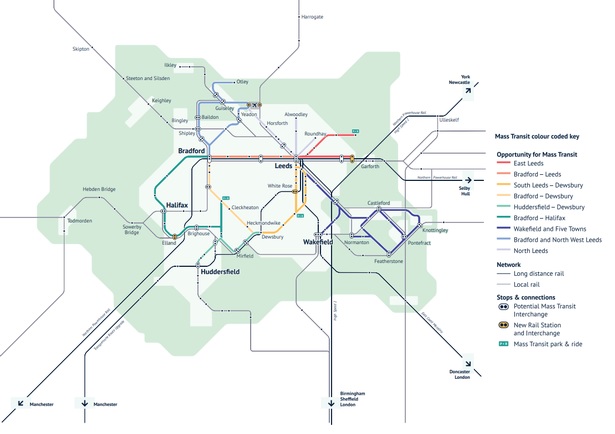Words: Richard Beecham, local democracy reporter
Senior politicians have hit out at Leeds City Council’s new transport strategy, claiming it is “unrealistic” to deliver it in time.
The comments come following the announcement of the latest form of the Connecting Leeds Transport Strategy, which aims to create a new mass transit system, reasonable bus fares and more walking and cycling over the next decade.
The proposed mass transit scheme – which could be rail-based – would have a line which goes through Armley, Bramley and Pudsey, on its way to Bradford.

The document also suggested that it “may need to consider” a London-style ultra low emissions zone in the future, in which vehicles could be charged for travelling in certain areas.
Both the Conservative and Liberal Democrat leaders have criticised the document, which they claimed might be “undeliverable”, while citing current uncertainties around Leeds Bradford Airport, HS2 and climate change targets.
Leeds City Council’s Labour administration said it would “not apologise” for having ambitious plans, and that a strategy to de-carbonise transport could not wait any longer.
It added that there were no current plans for a charging zone.
The document, which was released to much fanfare from the council last week, was discussed in a meeting of the authority’s decision-making executive board.
Leader of Leeds City Council’s Conservatives group Coun Andrew Carter (Farsley & Calverley) said:
“My view is that people haven’t taken any notice of some of the implications in this report. When they do, they will be bouncing off the ceiling.
“One example is the low carbon charge, with the quote ‘we may need to consider’ – that is code for road price. It is not in the proposals, but it is mentioned.
“You should have waited a little longer before bringing this before us.
“It seems to me that we are setting up a strategy that you know is not going to be achieved in the timescale you have set. No doubt you have decided who you are going to blame for that already.”
Coun Carter went onto cite the differing targets between the council, regional authority and central government, as to when they should reach a carbon-zero economy.
“I have no problem with the vision of where we want to get to,” he added. “But I have a problem with the fact that we have a national government, a regional mayor and a city council all with different targets for when we are going to achieve all sorts.
“You are not going to achieve all that’s in this plan in the timescale you have set – you are not. The Government’s target is 2050, and the people who hold the purse strings for highway interventions have a target of 2038 – eight years after our target.
“It’s time for some straight talking – let’s get some realism into this.”
Leeds City Council Liberal Democrats group leader Coun Stewart Golton added that he had concerns over the scheme’s “deliverability”.
The main aims of the strategy list getting funding to finally create a mass transit system, as well as more than doubling public transport numbers over the next decade.
It also committed to bringing forward a mass transit network “at the earliest opportunity”, following three failed attempts at creating such a system since the 1980s.
The council says it wants to more than double the number of rail and bus users, while increasing cycling by “400 per cent”.
Executive member for transport Coun Helen Hayden (Lab) said:
“I am not going to apologise for being ambitious – that is what we do in Leeds – that is what we have always done in Leeds.
“We are going to be ambitious – that is why we have a target of 2030. I dread to think what the world would be like if we all had a target of 2050 in mind.
“We haven’t got any longer to wait to bring out this report – we have to do it now.
“In terms of road user charging, it is something the Government might introduce, it would have to be discussed, there is no plans as yet and it is not part of our strategy.
“As far as we know with HS2, it is happening, and the Government has spent a long time planning that, and we will see when it gets delivered.”
Since declaring a climate emergency back in 2019, the authority is still not on course to achieve its target of being a carbon neutral city by 2030.
The council claims that the policies it has announced this week will contribute an extra 43 per cent in reductions to CO2 emissions by 2030.
Further reading
Check out West Leeds Dispatch‘s ongoing coverage of the Mass Transit System here.

